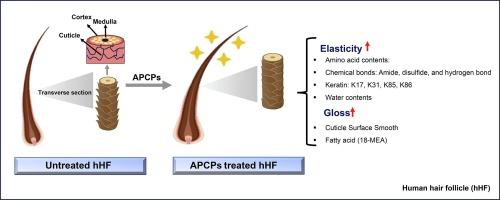AP胶原蛋白肽(APCPs)对发轴弹性和光泽度的影响:综合分析
IF 3.8
2区 农林科学
Q2 FOOD SCIENCE & TECHNOLOGY
引用次数: 0
摘要
AP胶原蛋白肽(APCPs)是一种经酶解的胶原蛋白肽,已被证明能促进小鼠毛发生长,改善毛发角质层结构和厚度。然而,它们对人类头发弹性和光泽的影响尚未得到深入研究。因此,本研究试图找出影响经 APCPs 处理的人类毛囊(hHFs)头发弹性和光泽的因素。通过飞行时间二次离子质谱(ToF-SIMS)分析,测量了与毛发弹性有关的氨基酸含量和与毛发光泽有关的脂质成分的变化。结果表明,APCP 处理导致脯氨酸和半胱氨酸氨基酸以及 18-甲基二十酸 (18-MEA)、月桂酸、油酸、11,13-二十烯酸、山嵛酸、甲基二十酸和角鲨烯等脂质成分含量增加。毛发横截面的傅立叶变换红外光谱(FT-IR)分析表明,在经 APCPs 处理的 hHFs 中,S=O、C=O、胱氨酸、C-N 和 C-H 等键的强度增加。此外,APCPs 还提高了角蛋白 17(内根鞘(IRS)和外根鞘(ORS)的组成部分)以及角蛋白 31、85 和 86(毛发皮质和髓质的组成部分)的表达。APCPs 处理还能增加 hHF 中的结合水和水分含量,同时降低角质层表面的粗糙度。这些研究结果表明,APCPs 具有增强头发弹性和光泽的潜力。本文章由计算机程序翻译,如有差异,请以英文原文为准。

The impact of AP collagen peptides (APCPs) on hair shaft elasticity and gloss: A comprehensive analysis
AP collagen peptides (APCPs) are enzymatically decomposed collagen peptides that have been shown to promote hair growth and improve hair cuticle structure and thickness in mice. However, their impact on the elasticity and gloss of human hair has not been thoroughly investigated. Therefore, this study sought to identify the factors affecting hair elasticity and gloss in APCPs-treated human hair follicles (hHFs). Using Time-of-Flight Secondary Ion Mass Spectrometry (ToF-SIMS) analysis, changes in amino acid content related to hair elasticity and lipid components associated with hair gloss were measured. As a result, APCP treatment led to increases in proline and cysteine amino acid, as well as in lipid components such as 18-methyleicosanoic acid (18-MEA), lauric acid, oleic acid, 11,13-eicosenoic acid, behenic acid, methyleicosanoic acid and squalene. Fourier-transform infrared spectroscopy (FT-IR) analysis of hair cross-sections indicated an increase in the intensity of bonds such as S=O, C=O, cystine, C–N and C–H in APCPs-treated hHFs. Additionally, APCPs elevated the expression of Keratin 17, integral to the inner root sheaths (IRS) and outer root sheaths (ORS), as well as Keratins 31, 85, and 86, components of the hair cortex and medulla. APCPs treatment also resulted in increased bonded water and moisture content in hHFs, along with a reduction in cuticle surface roughness. These findings suggest that APCPs may have the potential to enhance hair elasticity and gloss.
求助全文
通过发布文献求助,成功后即可免费获取论文全文。
去求助
来源期刊

Journal of Functional Foods
FOOD SCIENCE & TECHNOLOGY-
CiteScore
9.60
自引率
1.80%
发文量
428
审稿时长
76 days
期刊介绍:
Journal of Functional Foods continues with the same aims and scope, editorial team, submission system and rigorous peer review. We give authors the possibility to publish their top-quality papers in a well-established leading journal in the food and nutrition fields. The Journal will keep its rigorous criteria to screen high impact research addressing relevant scientific topics and performed by sound methodologies.
The Journal of Functional Foods aims to bring together the results of fundamental and applied research into healthy foods and biologically active food ingredients.
The Journal is centered in the specific area at the boundaries among food technology, nutrition and health welcoming papers having a good interdisciplinary approach. The Journal will cover the fields of plant bioactives; dietary fibre, probiotics; functional lipids; bioactive peptides; vitamins, minerals and botanicals and other dietary supplements. Nutritional and technological aspects related to the development of functional foods and beverages are of core interest to the journal. Experimental works dealing with food digestion, bioavailability of food bioactives and on the mechanisms by which foods and their components are able to modulate physiological parameters connected with disease prevention are of particular interest as well as those dealing with personalized nutrition and nutritional needs in pathological subjects.
 求助内容:
求助内容: 应助结果提醒方式:
应助结果提醒方式:


